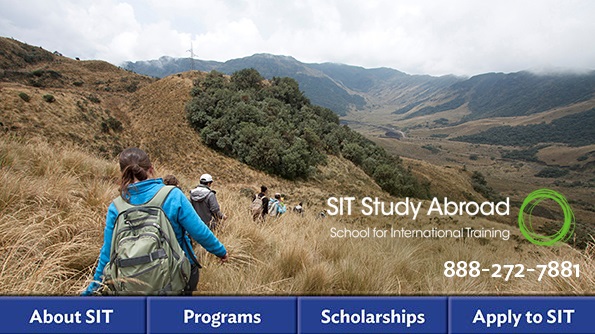
Major Topics of Study
- Ethnobotany
- Marine studies
- Lemur ecology
- Biodiversity in Madagascar
- Environmental challenges and conservation and development strategies in Madagascar
- Human pressures — including mining and economic development, deforestation and land use, and ecotourism — placed on the country’s ecosystems.
Please visit the SIT Study Abroad website for details on the program courses (including syllabi), educational excursions, and housing.
Program Structure
There is no "typical day"on an SIT program. Activities may take place on any day of the week and at any time of day to be in accordance with according to local norms and to take advantage of once-in-a-lifetime learning opportunities. Thus, the schedule and structure of the program are likely very different from what students are used to on their home campuses. The semester progresses in phases:
- The program begins with a thorough orientation.
- During the first two and a half months of the program, students are engaged in foundational coursework, including:
- thematic seminars, including education excursions,
- language instruction focused on improving practical communication skills, and
- a field research methods and ethics course that prepares students to conduct independent research.
- For the last month of the program, students conduct an Independent Study Project (ISP) on an approved topic of their choosing.
- Finally, students present their project, participate in program evaluations, and prepare to return home.
What Makes SIT Unique
- SIT Study Abroad offers a field-based, experiential approach to learning.
- Each program has a small group of students (typically 10–35).
- On an SIT program, students gain high levels of access to many different stakeholders and experts relevant to the issues the program is examining.
- While some learning will be conducted at the SIT program center, extensive learning is done outside the classroom — in host communities, field stations, NGO headquarters, ecological sites, health clinics, and art studios.
- Many students go on to use their Independent Study Projects as a basis for senior theses on their home campuses. Others use their undergraduate research and overall study abroad experience to successfully apply for fellowships such as Fulbrights and Watsons.
Money Matters
Be sure to discuss how study abroad costs are handled at your school with your study abroad advisor.
SIT tuition and room and board fees include the following:
- All educational costs, including educational excursions
- All accommodations and meals for the full program duration
- Transportation to and from the airport, and on all educational excursions
- Health and accident insurance
Scholarships:
- SIT awards nearly $1.3 million in scholarships and grants annually.
- All scholarships and grants are need-based.
- Awards generally range from $500 to $5,000.
- The SIT Pell Grant Match provides matching grants to all students receiving Federal Pell Grant funding when it is applied to an SIT Study Abroad semester program.
- Contact the financial aid and/or study abroad office(s) at your college or university to learn if your school’s scholarships and grants and federal and state aid programs can be applied to an SIT Study Abroad program.
Contact SIT Study Abroad
Program Details
Eligibility: 7.5 cumulative GPA; four semesters of college-level French, course work in ecology/biology.
Advising Notes: If the SIT location is not on the SAGE approved list, an interview with a returnee is required.
Visa Information: All students must have a passport valid for at least six months after the program’s end date to study in another country. Students should apply for a passport as early as possible; in some cases, passport applications may need to be expedited. Students may need one or more visas, in addition to a valid passport. Visa application processes vary widely, and some visa processes are multi-step and complicated. SIT Study Abroad helps students to understand the visa process for each program. The SIT admissions counselor can answer passport and visa-related questions and concerns. Non-US citizens should consult with SIT early to determine the visa requirements based on their country of origin. SIT Study Abroad cannot guarantee visas for its participants, and it is ultimately the student’s responsibility to secure the appropriate visa in a timely manner.
Budget Planning: (Coming soon!) For budget planning purposes, click
here to view the current cost of living comparison between Madagascar and Los Angeles.